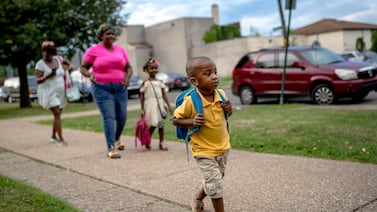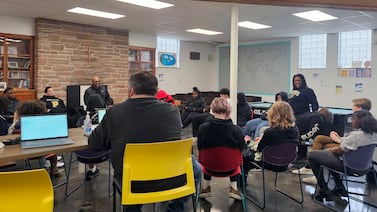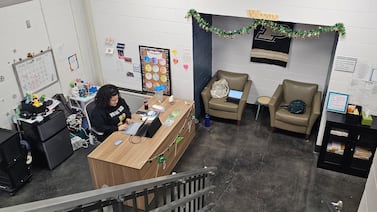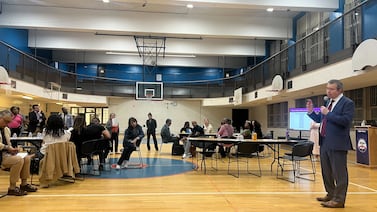A ski resort in Steamboat Springs, a community hospital in Grand Junction, and a food hall project in downtown Pueblo.
On the face of it, they don’t have much in common, but all three have ambitious plans to launch child care centers for their employees within the next two years.
They’re among 10 Colorado employers participating in a new program that guides businesses through the complicated process of opening child care centers on their sites or nearby. Called the “Design Lab” and conducted mostly through biweekly Zoom sessions, the five-month program is funded with $54,000 from the state and run by the business group, Executives Partnering to Invest in Children, or EPIC.
If all goes as planned, the effort could produce nearly 500 new child care slots across Colorado and give participating employers a new tool for recruiting and retaining workers. The Design Lab is unfolding as Colorado leaders work to bolster an industry pummeled by the pandemic and enlarge the provider pool in preparation for a major expansion of state-funded preschool in 2023.
At the same time, a new state grant program will send nearly $9 million this year to help Colorado employers cover the cost of building child care centers for their workers.
Currently, there is enough licensed child care in Colorado to serve only about 62% of the 246,000 children under 6 who need it.
State officials say employer-based child care represents part of the solution. Such offerings reduce staff turnover, shrink commute times, boost morale, and provide child care hours that better match parents’ work hours.
Design lab participants, which also include cities, school districts, a hotel, a senior living facility, and a food production company, say the program has been invaluable in teaching them about a topic outside their area of expertise.
“It was like a college education in opening a child care center,” said Nathan Stern, director of development at Fuel and Iron Realty, which is leading the Pueblo food hall project.
“It’s been so vital for us because we have learned absolutely every minuscule detail necessary not only to design a facility but to open a facility thoughtfully,” said Loryn Duke, communications director at Steamboat Ski & Resort Corp.
Nicole Riehl, president and CEO of EPIC, said most or all of the employers in the Design Lab will likely end up hiring an operator for their new centers — perhaps a child care chain or a local early childhood leader — rather than running the facilities themselves. But business leaders planning such facilities still need a solid understanding of the highly regulated world of child care licensing, governance, and financing.
“We cover the whole gamut,” said Riehl, who hopes EPIC will be able to offer Design Lab to a second round of Colorado employers.
Duke said the ski resort plans to open a center to serve the children of employees as soon as next November. It will enroll about 35 children, including infants and toddlers, a population for which it is particularly difficult to find licensed care. While lots of details are still in the works, she said it’s likely the center will charge sliding-scale fees based on family income.
Duke, who has a 10-month-old daughter, is familiar with the wild goose chase many families experience in the search for child care. She signed up for child care waitlists even before she shared the news of her pregnancy with her family. After baby Eloise was born, Duke called a local child care center twice a week for 2½ months to see if a spot had opened up. When that finally happened, even though it was for only two days a week, she and her husband jumped on it.
As “insanely stressful” as the lack of child care can be for parents, Duke knows how damaging it can be for businesses trying to find and keep staff.
“It’s long been proven that retaining employees is more cost beneficial than rehiring,” she said.
Before the resort’s child care center plans began taking shape last summer, Duke and two close co-workers, who are also working moms, were on the brink of quitting.
“There was a moment all three of us thought we would have to resign because we could not find child care,” she said.
At Community Hospital in Grand Junction, the shortage of local child care has been a problem for its employees since before the pandemic. (Several years ago, the county health department even spearheaded a campaign to create thousands of new child care slots.)
Now, with guidance from the design lab and an employer-based child care grant from the state, hospital administrators are planning to build a 10,000-square-foot child care center near the “Lion’s Loop” walking path behind the hospital. The center is scheduled to open in early 2023 and will have room for 100 children, with care starting at 6 weeks of age. Eventually, the center could operate around the clock, and project leaders are considering the possibility of offering care when children get sick.
Tawny Espinoza, vice president of business development at the hospital, said the Design Lab experience showed hospital leaders their plan to build a child care program from scratch was feasible.
“Child care is not our wheelhouse. We do health care,” she said, “EPIC was able to … create a roadmap for how to get from point A to point B.”
Although the project is about a year from completion, Espinoza said many of the hospital’s 1,200 employees are already showing interest.
“I get emails almost daily of, ‘Hey, when will that be open,’” she said.
The leaders behind the Fuel and Iron Food Hall on the edge of downtown Pueblo plan to create a 54-seat child care center just east of the historic former hardware store that anchors the project. They’ll offer subsidized child care to employees of the five restaurants in the food hall as well as residents of the project’s affordable housing units. In addition, they hope to offer child care until 8 p.m. to align better with restaurant shifts.
Like Community Hospital, Fuel and Iron recently won one of four state grants for construction of employer-based child care facilities. More of those grants could be awarded this spring.
“Without grants, I don’t know how we could justify the cost of building out a child care center,” said Stern, of Fuel and Iron Realty.
But with restaurants in fierce competition for employees, he believes the new center will help recruit and retrain the best candidates for the food hall.
Child care is “critical to a healthy workforce, which is critical to a healthy business community,” he said.








